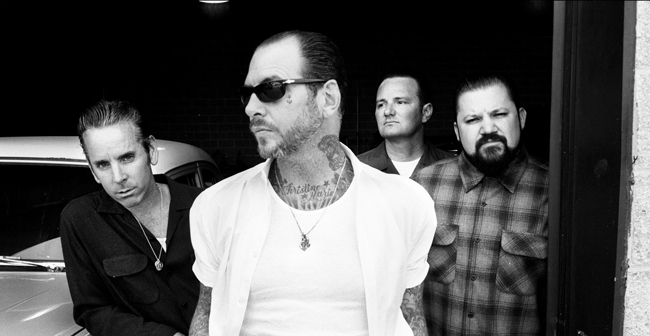Music
 Photo: Danny Clinch
Photo: Danny Clinch
California Punk Legends Social Distortion Bring Attitude to Fillmore
August 8, 2017 @ 12:00am
In a notoriously fickle music business, Southern California punk rock legends Social Distortion are a rarity.
The band has released a mere seven albums in 35 years, and it’s been a full six since the release of their last record, Hard Times and Nursery Rhymes. Yet, the band never falls far off of the national rock ‘n’ roll radar. In fact, their popularity just keeps growing.
On this summer’s tour, the Orange County, California-based act is routinely selling out large clubs across the country, including a show at the Fillmore Silver Spring on August 13. Mike Ness’s sharply-written tales of hard cases and lost souls, ferociously delivered over Social Distortion’s bruising melodies and infectious hooks, still inspires rock fans of all ages. The proof is in the multi-generational crowds that now populate the live shows.
With the Fillmore date drawing near, On Tap talked to Ness about Social Distortion’s impressive longevity, his somewhat reluctant foray into political songwriting, playing DC, working with Bruce Springsteen, country music influences, parenthood and the long-awaited new record.
On Tap: Thanks for taking time to talk with On Tap Magazine. Let’s start with the obvious: how has Social Distortion managed to stay relevant for nearly four decades?
Mike Ness: From a marketing standpoint, I have no idea [laughs]. I’m sure record labels would like to know the secret of this, that way they could do it with every one of their bands. Social Distortion is a strange phenomenon. I certainly don’t take it for granted. We managed to write songs that are timeless and not stuck in any one genre, and we’ve been able to do that across three generations. I see parents bringing their kids now. There are 70-year-olds in the crowd and there are six-year-olds. I’m so grateful for that. It’s hard to believe we are more popular now than we were 15 years ago. Thirty years ago, there were just 100 people in the room. It’s been a strange, gradual, organic and upward movement.
OT: We understand you’re planning a new album. Do you have any news to report on that front?
MN: Well, I’m not really able to write on the road because of the grueling schedule. You really spend the whole day preparing for the show. The touring machine has to be shut down, and then I can get into a writing mode, and find isolation and really just finish everything I’ve started. I’ve got a great foundation for the record. We have some amazing songs. They just need to be finished and focused. You have to live life a little to have stuff to write about. That’s why there’s a gap between records. If I was doing a record every two years, mediocrity [would] set in.
OT: We’ve been reading that politics – never a big theme in Social Distortion’s lyrics – are emerging more on this current tour, at least in some of the stage banter. Will the new record reflect our current political reality with Donald Trump in the White House?
MN: I feel a certain responsibility to do that. I’ve never been a political writer. I don’t like to write topically because we’ve all heard songwriters on NPR singing about all of the things that aggrieve them all in one song and it can become trite, you know what I mean? But I’m up to the challenge regardless because I feel a certain responsibility. I wrote this song called “Hail to the Red, White and Blue,” and it’s an aggressive song and an angry song. I just need to hone it more, to catch just the right emotion and get to the sentiment that the United States has become arrogant. You can’t blame Trump entirely, but Trump is a product of this. It’s challenging to write. The only political song I’ve ever written was “Don’t Drag Me Down,” and that was really more targeted at racism.
OT: You will have a pretty politically astute audience here in the nation’s capital. It’s also a place with a rich punk rock history. Any comment on Social Distortion’s relationship with DC over the years?
MN: We’ve been playing DC for 30 years, at least. I remember pushing the freakin’ school bus in downtown DC when we broke down on the Another State of Mind tour back in 1982. That was our first time there and it seems like another lifetime ago, but that was the beginning of what is now. We have a rich history there. It’s part of where we cultivated our fan base in our early days.
OT: This question may be a little predictable at this point, but there are rock fans who see that the popular emphasis has shifted to hip-hop and electronic music and wonder about the future of basic, organic rock ‘n’ roll. As a songwriter and electric guitar player, are you concerned about the rock genre’s future at all?
MN: Not as long as I’m f–king alive. I’m going in the opposite direction. That’s why I wrote a record like Hard Times and Nursery Rhymes to establish our firm roots. I grew up with music, and since probably 1966 to 1979, I was immersed in blues-based rock ‘n’ roll – classic rock ‘n’ roll – for lack of a better term. I grew up with these thick grooves – ZZ Top, Bad Company, Sam & Dave – the Motown stuff where there were these thick grooves and a deep blues base. Over my motherf–king dead body am I going to let some slacker generation come in and kill that.
OT: One of the many interesting side notes to your career is your friendship and collaboration with Bruce Springsteen, a superstar who is pretty far removed from the punk rock tradition. How did that friendship come about, and what has it meant to you personally and professionally?
MN: It was when we released Somewhere Between Heaven and Hell in 1992 and he was being interviewed in Rolling Stone, and he said it was one of his favorite records of the year. It was huge – what a huge endorsement. Here’s a huge star that still pays attention to what’s going on. It’s helped instill confidence and it’s validating. It’s kind of like, “F–k man, Bruce Springsteen wants me to come up and do ‘Bad Luck’ (from the 1992 Social Distortion record) during his set.” He loves playing solo to that song and he loves singing it, and I get it! I have moments when I’m like, “I wish I would have written that song.” That’s how I choose my cover songs.
On Tap: Of course, you famously covered Johnny Cash’s “Ring of Fire,” and your two solo records are steeped in country and rockabilly. How did country music come to inform your sound?
MN: That’s the music my father had around the house – Johnny Cash and Buck Owens and Merle Haggard and stuff like that. It was the first time I heard the Carter Family and some of the early black blues. It just resonated with me. When I heard the Carter Family the first time as a kid, it was Depression-era music, but it had this urgency and desperation and suffering. I related to it; I relate to suffering. It’s working-class music and about working-class issues, and I saw a direct connection between that and punk rock.
OT: Where do you hang your hat these days? Still have your family in Southern California?
MN: Yes. We’re empty-nesters now – we’ve raised two boys that we are very proud of. They’re working and I feel good about that as a dad. I’ve shown them the nicer things in life and I’ve also shown them if you work hard in life you can have these nice things, but they know I’m not going to just give it to them. I still live in Orange County. It’s a love-hate relationship. Now and then I’m reminded that this was a conservative county when it was developed, and it still is. It gives me plenty of constructive angst.
OT: Any other thoughts for your DC fans or the upcoming show at the Fillmore?
MN: I’m looking forward to it. I’m going to take a couple of days off to recharge and we’re going come in and hit it hard.
Fillmore Silver Spring: 8656 Colesville Rd. Silver Spring, MD; 301-960-9999; www.fillmoresilverspring.com








